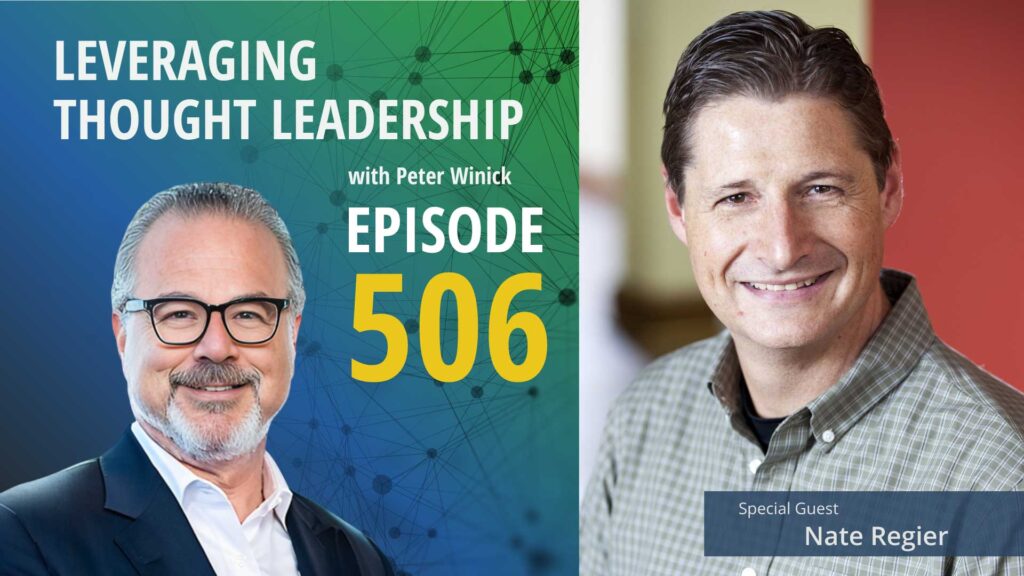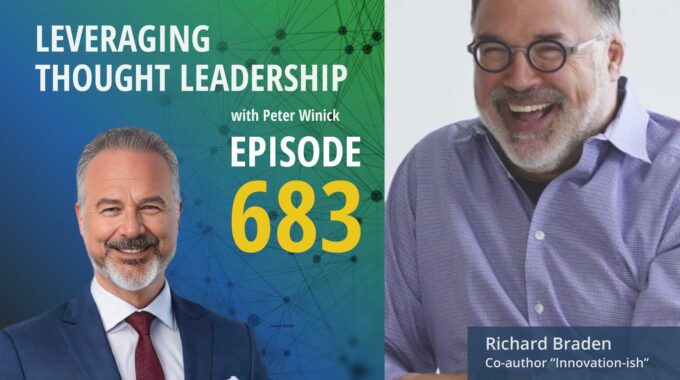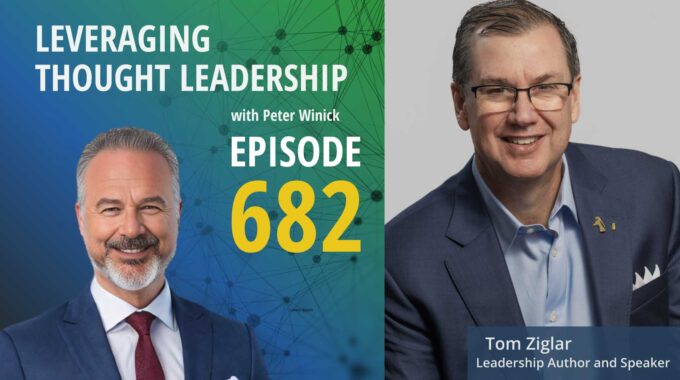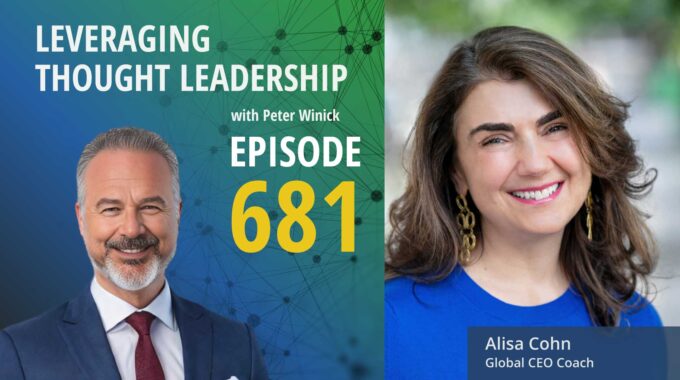A field-tested framework for leaders who want better margins, cleaner operations, and a stronger culture…
Compassionate Accountability | Nate Regier

How leaders build connections and get results.
An interview with Nate Regier about his newest book on merging accountability and compassion to create a healthy leadership culture.
Accountability and compassion are often thought of as opposed concepts.
But, together, they can have a transformational effect on employees, leaders, and the culture of your organization!
In order to understand how to merge these two concepts, I’ve invited Nate Regier to join me on today’s podcast. Nate is the Founder and CEO of Next Element, a global leadership firm helping build cultures of compassionate accountability, and author of the book, Compassionate Accountability: How Leaders Build Connection and Get Results.
Nate explains the idea of “Compassionate Accountability,” and why putting the two ideas together can create psychological safety and build trust that ultimately leads to stronger relationships and increased performance.
Now that we know what Compassionate Accountability is, how can we practice it? Nate explains how he has developed a working definition of compassion that helps to shift our mindsets. This mindset is about more than simply getting along it is about being an active participant in solving problems and being in the trenches together.
Not only does Nate help us understand how to practice this mindset he shares how you can deploy it across your entire organization! In order to do that you have to be clear about what the behaviors norms are. Nate lays out the six areas of organizational life where you can apply this new lens, how you can identify critical behaviors being manifested, where the gaps are, and where the opportunities for improvement are.
If you want to see revolutionary change in yourself and your organization you’ll want to listen to this episode and immediately pick up Nate’s book!
Three Key Takeaways:
- Leaders that hold people accountable without also treating them as valuable and capable will not have employees for long.
- Compassion is a teachable and learning capability. And it can have a dramatic positive impact on people’s lives.
- If we struggle together and bring more compassion to the world then everyone wins.
If you need a strategy to bring your thought leadership to market, Thought Leadership Leverage can assist you! Contact us for more information. In addition, we can help you implement marketing, research, and sales. Let us help you so you can devote yourself to what you do best.

Transcript
Peter Winick And welcome, welcome, welcome. This is Peter Winnick. I’m the founder and CEO at Thought Leadership Leverage and you are joining us on our LinkedIn live version of our podcast, which is leveraging thought leadership. And today my guest is an old friend, Nate Rozier, Dr. Nate Rozier, who’s got a new book out as opposed to an old book out. He’s got old books too, But Nate is the CEO and founding owner of Next Element, which is a global leadership firm, helping build cultures of compassionate accountability. He’s the coauthor of Beyond Drama and the author of Conflict Without Casualties and Seeing People Through. He’s the host of the On Compassion with Dr. Nate podcast, writes a blog weekly and contributes to many industry publications, and he is also a all around good guy and friend. So. So, hey.
Nate Regier Thank you. Good to be here. Peter. Great to be with you and your listeners today.
Peter Winick Yeah, and we see the book is trending really nicely early on, which is always exciting. Yeah, well, let’s start with before we get into the what is compassionate accountability, let’s get into, you know, this isn’t your first rodeo, right? So what has been different about the experience this time in not just writing the book, but we’re in the early stages of the launch compared to your previous post?
Nate Regier Oh, man, You know, this one has been a lot more intense because we’ve pulled out all the stops we’re doing. We’re kind of bringing together everything that we maybe should have done but didn’t do last time and really trying to bring it all together. So we’ve got a lot of irons in the fire, a lot going on, which is different in terms of how we’re launching this one. Also, you know, times have changed since my first book was like 2015, I think. And just the way social media has changed, the way we connect with people, the way publicity and reach works, it’s just so different. So aside from how this book is just different in terms of its content, that process has been a lot different.
Peter Winick Yeah, So let’s get to the content because I think, you know, if ever there was a moment in time in this post-COVID craziness that we’re living through right now for something like compassionate accountability, your timing is kind of perfect. But let me ask you the silly question. I know the answer to what is compassionate accountability because it seems like, yeah, usually this should be two books, How to be Compassionate, and then How to Hold People accountable. And there was always this implied separation of church and state.
Nate Regier Yeah, yeah, yeah.
Peter Winick We found that was fun to talk about. Yeah.
Nate Regier Well, it’s when people see these two words together and we’ve been using this phrase probably since 1716 set 19 seven or 2017. And when people see those two words together, their first reaction is kind of like, what? Like those aren’t supposed to go together. And then when they see it, it’s like they go, Oh, that would be amazing. Like if it was possible. And so the notion is these are, you know, compassionate is not like an adjective. Let’s do accountability. But nicely. It’s really about bringing these two things together as a in unison, working together as a team and rejecting the notion that the two are somehow intention, that they’re somehow an opposition. That’s the biggest challenge that a lot of leaders have, is acting as if these two are against each other and somehow you have to choose a side or you have to reconcile it.
Peter Winick Well, and then the subtitle speaks to that how we will build connection and get results, because often then those two concepts would be separated, right? Here’s the ten ways to get results. Maximize your this, you know, whatever. And then building connections also. So there’s this out in the magic blend of the hard and the soft the left brain right putting on your piece which kind of I mean, I’ve gotten to know you over the last several years. That’s kind of how you roll, right?
Nate Regier So yeah, it really is. And I’ll be honest that my natural tendency, my personality, I tend towards when push comes to shove, I go accountability at the expense of relationships, at the expense of connection. But we know that psychological safety helps with results. We know that connection builds trust, which increases performance. So it’s possible for us to embrace a kind of compassion that actually walks through the tough stuff together and uses connection as an avenue towards accountability and uses and actually the process of accountability actually build stronger relationships and tighter connections.
Peter Winick And then if you look at it a little bit differently, compassion in the absence of accountability might be placating or even enabling. Right? And then accountability in the absence of compassion could be seem is as brutal or harsh or whoa, why does it need to be like that? So I guess the question so now that we understand sort of what it is, how do you practice it right so far? Or a manager and say, okay, I dig this, Nate. This makes a lot of sense to me. But I’ve been the hard, accountable KPI metrics guy. Now, how do I throw a little compassion into the mix?
Nate Regier It starts with mindset. It really starts with shifting the way we see ourselves in other people. We know that mindset matters and it’s a choice we make and attitude we have. So we’ve developed a working definition of compassion that helps us shift our mindset. So in the old days, we maybe thought of compassion as empathy in action. Our heart goes out to people and we want to go alleviate the suffering. And that’s kind of the more altruistic, friendly kind of compassion. But what if you look at it this way, what if we think of compassion as much more than that? And we’ve defined compassion as the practice of demonstrating that people are valuable, capable and responsible in every interaction. So those are big words, valuable, capable, responsible. So it starts with a mindset by saying, Wait. Compassion doesn’t just mean that everybody’s great. Everybody’s going to get along. But it says they’re also capable, which means we we are contributors. We’re participants were agents in solving the biggest problems. And we have to be in this together. And we’re responsible, which means we have to be really careful about who’s responsible for what so that we can all be responsible for our stuff.
Peter Winick And then I think there’s an implication in the way you frame that of respect. Right. Because I could hold you accountable, but it doesn’t mean I have any respect for you.
Nate Regier Right. Right. I could. I could. I can hold you accountable and not care about you as a person, not care about how you’re experiencing work. And, you know, we know the research that 70% of engagement is based on the relationship with the leader and leaders that hold people accountable without also treating them as valuable and capable are not going to have employees for long.
Peter Winick So now let’s think about this through the lens of what is the application or the derivatives that are in the book that are applicable at the organizational level. Right? Because for me, as a leader, as a manager, I get it. But how do we how do we start to think about this and embrace it at the organizational level?
Nate Regier I’m glad you asked, because that was a really important purpose or goal for this book was don’t just focus on mindset, which is important. Don’t just focus on the individual interactions. You know, a lot of books, will they all here’s how to have a tough conversation or here’s how to say it nicely. It’s like, okay, that’s great, but let’s elevate it and say, What if we looked at organizational culture systems processes through this lens? And so we have a whole section of the book dedicated to implementation. First, it’s first. It starts with getting clear about what are our behavior norms, how do we start setting norms for how we’re going to be with each other so that we are affirming human value, capability and responsibility all the time. And then we lay out six different areas of organizational life where you can apply this lens and look strategically at things like, how are we doing talent recruitment and talent development? Are we developing people in this way? What about the way we look at performance or discipline?
Peter Winick Stay with the development piece for a minute, because I think there’s certain traits like compassion potentially, and charisma, and we can fill in the blanks on some others. There’s an inherent belief which I think is wrong, that that’s just a trait nature, charismatic God, nature and a guy. That might be true, but I think part of what your argument is and the capabilities development is, is, well, maybe I’m more compassionate than you are, but it is a capability and therefore it is teachable. I can develop my compassion.
Nate Regier Is it’s teachable. It’s learnable. We have data from 11 countries, 25,000 data points of research over the last decade showing that you can teach people compassion, they can learn it, they can practice it, and it can have pretty dramatic, immediate results in people’s lives. So, yeah, it is teachable. And I actually dedicate a whole chapter in the section on barriers to this belief that compassion can’t be learned. You know, nobody. Yeah, you just have it right or you don’t have it. And that’s a myth. And anybody can learn it. Anybody can practice it.
Peter Winick So, you know, throw empathy in the mix, really like somebody empathetic or not. I love that you’re busting this myth of this binary component of is or not, because that’s actually an excuse. Yeah. Oh, you’re just not a compassionate person. Oh, okay. I mean, he gets to be a jerk, right? Like, yeah, I mean.
Nate Regier That, you know, in my last book, I said, personality is not an entitlement program, okay? We all have styles, we all have tendencies, we all have personalities. That’s great. And an effective leader of the future is going to have to reconcile these two is going to have to be compassionate and accountable at the same time. The up and coming employees, they demand both. They don’t want compromises. And so we’re going to have to learn how to do it. And instead of resting or hiding behind these things as excuses, we have to learn how to do it and embrace it.
Peter Winick Yep. So give us just a very, very high level overview of how when I say you, it’s not just you, it’s the systems of the things that you have. How would you be teaching? A subset of an entity how to be more compassionate.
Nate Regier Well, it starts with really getting a sense for where people are. So we have a diagnostic assessment tool in the back of the book that we created, and anyone can use it on their own. They can download copies from our Web site. But when we use that with an organization like a department, a team, we are bringing in a couple other assessments and take a look at to what extent are the critical behaviors being manifested now where the gaps or the opportunities. And then we do have specific leadership development courses and programs that help build those competencies. And we also can provide consulting on how to incorporate those in policies, procedures, systems that will then reinforce those concepts and patterns throughout.
Peter Winick If you’re enjoying this episode of Leveraging Thought Leadership, please make sure to subscribe. If you’d like to help spread the word about our podcast, please leave a five-star review at ratethispodcast.com/ltl and share it with your friends. We’re available on Apple Podcasts and on all major listening apps as well as that thought leadership leverage dot com forward slash podcast.
Nate Regier Do you want to touch for a moment on some of the benefits or the outcomes? Because I think at some level people, you know, now that we’ve framed this are going, yeah, that makes sense, makes a lot of sense. There’s not a lot of anti-compassion, anti-accountability people and if you’re listening you can go tune in somewhere else if that’s your thing. Yeah. So what’s the benefit? What’s the so what?
Nate Regier Sure. So there’s three areas where I show benefit in the book. The first one is what does the research say? So I’m a lot of great literature out there showing that compassion improves leadership effectiveness and improves psychological safety. It improves team performance. We also have a ton of data that we’ve collected that we share, and there’s four critical areas leadership skills, teamwork. Personal and professional competence where they feel like they’re more competent as a professional. And interestingly enough, some of the biggest gains we see is in personal effectiveness. They say my relationships at home are more effective. I’m dealing with, you know, the committee that I’m on at church. So much better now.
Peter Winick Yeah.
Nate Regier And then I also have a whole section on case studies I share for case studies where we’ve worked with organizations and everything from moving towards high quality and health care, towards reducing turnover in another situation, towards even dealing with inappropriate behaviors like disruptive behaviors in a classroom.
Peter Winick Interesting. Thank you. Let’s shift gears for a moment and move from Nate, the author, to Nate, the CEO of a consulting firm. Right. So you’re obviously CEO, you know, and the founder. Tell us a little bit about the type of work that the firm does and how the book is partly not just in service of the reader, but the business.
Nate Regier Yeah, no, thank you. And that’s been a big part of this book as a CEO. You know, I’m an entrepreneur, whereas we’re a small company, but we’re always evolving, always trying to, you know, to be relevant. This is the first book we’ve written that is not about a model like a training program or a training system. This is a this is a book that’s about frameworks, philosophy, implementation and strategy. And so for the first time, we’re really repositioning ourselves to we can provide terrific leadership development training. We’ve done that. We’ve mastered that over the last 15 years. But we’re really starting to say, wait, we also have a lot of in collective intelligence on how to see an organization, a culture in it through a different lens and be able to provide those insights and that intelligence to our clients so that they can make more strategic, better strategic decisions, and then also provide consulting where we can help guide, you know. The simplest thing, like how do you hire for a compassion mindset? What are the questions you even ask? So we can start providing higher level consulting now and increase the breadth of the ways in which we’re leveraging all of the collective intelligence and thought leadership that we have amassed over the last 15 years.
Peter Winick Thank you. So a little bit of a different thought. And that’s this. So the principles, the models, the research case studies and such are in the book were written at a moment in time. Right. And then life happens. The world happens. Different trends happened. And as you’re talking, I’m thinking about, you know, psychological safety. We’re hearing that word as an example today.
Nate Regier Yeah.
Peter Winick Ever had. Right. And it’s just whether it’s cultural, whether it’s an outcome of COVID, whether it’s, you know, whatever. You didn’t write this book to be a tool for psychological safety. But I think you can argue, yeah, that’s a good tool for psychological safety and engagement and turnover. So how do that.
Nate Regier Man. Yes. So so the timing of this book is critical because of coming through COVID. It the pandemic revealed so many things that were right, so many things that were broken, and it forced us to to evolve so quickly in a lot of ways. So we got to write this book during watching all of this happen. So now the book actually speaks to things like why so many DIY initiatives stall out because they’re dealing with the value switch, but they’re not talking about capability and responsibility. And so nobody knows how to have tough conversations around behavior in the context of DIY or hybrid work. Return to work. This is emerging. It’s changing every single day. So we were able to look at these concepts and say, what’s evergreen and what is emerging? So we could kind of, you know, look at the tea leaves and try to look out kind of where things going. And so there’s a lot of that kind of prognosticating going on here, too.
Peter Winick Yeah, I think, you know, what a good litmus test for a piece of thought leadership is. Throw an issue, out it at it and see if it sticks. So as you as you’re talking, I’m thinking about compassion, accountability. What might the application be in that in helping organizations struggling with, you know, we have five generations in the workforce. Yeah. Yeah. So how would that versus millennials? You probably may or may not have thought of that your writing the book but I think there’s you yeah. You made there.
Nate Regier Well look at look at the image below the cover right behind me it’s we chose that very carefully to emphasize there’s two different forces here, but they’re linked and they’re working together and we need each other. So when you look at multigenerational, we’ve written quite a lot on that is how does this apply to getting generations to respect and value each other, but also joined forces to leverage each other’s expertise towards a common goal? And it goes back to my original definition of leadership, which is herding cats. I mean, sorry, it’s leveraging diversity towards a shared goal. And you have you can’t do that without compassionate accountability.
Peter Winick Got it. Cool. So any anything you want to share in terms of some of the things that you’re doing around launching the book differently than you did a few years ago or experiments? Because I think the other piece is when people move into sort of book launch mode, they’ve got their playbook put up the playbooks more than, you know, I don’t know, a year old or five years old or something like that. I think it’s healthier to think of it as a series of experiments, and by definition, some experiments fail on some.
Nate Regier Yeah, well, you know, an experiment has been, well, something that we’ve really done more of this time than ever is asked for help. It’s one of the principles in our book is get vulnerable. Don’t try to be the expert. Nobody knows everything, but everybody knows something. And so we’ve asked for so much help. We’ve our launch team is massive in terms of people that just care and they want to help. And so we’re growing our network of influence and reach by leaning on people. So that’s new. And, you know.
Peter Winick Let’s stay there for a minute, because it used to be that there was the author and then everybody else is a potential reader. But there’s this group in the middle. So part of the launch group are people that know you love, you are aligned with your thinking, our fans, and we want people that we know and love to be successful, right? What happens is somebody is writing a book. They like their friends and colleagues and such, and they go, Hey, that’s great. Let me know what I can do. Which means member stations over. You did a beautiful job of the launch team starting, what, five, six months ago, at least.
Nate Regier Oh, at least. Yeah, I think it was. It was fall of last year.
Peter Winick So almost a year ago, recruiting people, starting to share with them some of the back story. Ooh, final manuscripts, right. Starting to get a little bit of behind the scenes and then slowly but surely doing a little bit of asks hey will book review up Hey, could you post this on social And people are not only rooting for you, they’re rooting for themselves because team is hey, I didn’t write the book, but I feel like I want this to be as successful because I’m part of a launch. Who wants to launch something that fails? I don’t wanna be part of a failure.
Nate Regier No, and I think we are. What we’re hearing with from some people that are so excited to support the book is they’re saying, Wait, you have given a name to something that is been emerging like that. Finally, the name Compassion. Accountability is something I’ve cared about and tried to put my fingers on for years. So we’ve aligned with people who have an abundance mindset, who know there’s plenty to go around. We all know we’re barking up the same tree. We’re all just trying to do it in our own way. So why not help each other and raise the tide?
Peter Winick Yeah, I think that’s the other piece that’s interesting is that in this world of authors and thought leaders, it can be a lonely world. Writing tends to be an integrated alone activity. But once you start to recruit friends that are, that are also authors and such, it’s not a Coke and Pepsi, right? So you’ve got and I know your relationship with the MAG 100 etc. lots and lots of author friends and you’re not afraid to lean in and ask for a little bit of help because just because I bought Marshall’s book doesn’t mean I’m not going to buy your book. In fact, it means I have a higher propensity to buy your book, which cross referred as well. And I think that’s an interesting.
Nate Regier Yeah. Well, I had someone on my podcast, Kristen Neff. She’s a really well known researcher, author in the Self-compassion world. And there’s some things in my book that I disagree with, some of the stuff that she’s teaching, so why not have her on? Let’s talk about it because the fruit of our conversation, if we struggle together towards bringing more compassion to the world, everyone’s going to win.
Peter Winick Right. Right. And I love that idea of because a lot of people would go the other way. Oh, we don’t agree. Therefore we shouldn’t talk. Well, that’s stupid, right? So the fact that you don’t necessarily see eye to eye on everything is actually the basis of an interesting interview or conversation or dialog, because you’re going to do it with respect. It’s not going to degenerate into ugliness. Hey, I see the world this way. You see it this way. Bottom line is, whoever the listener is or the reader of that piece is has the benefit of two great minds.
Nate Regier Well, it’s the dynamic tension, I think, is where all the transformation happens. If we can stand in that tension, respecting each other, keeping our switches on. Amazing things happen.
Peter Winick Yeah, exactly. So what’s next in terms of for you, for the business, what you see.
Nate Regier In a lot of naps, a lot of I’m still dealing with jetlag from coming back from Europe. So when I get a good eight, nine hour night, that’s going to be my trigger. It’s time to start thinking about what’s next. But yeah, you know where a book launch is a big event, but it’s just one step along the way. So we’re really now going to start thinking strategically about our marketing, our outreach, how we’re going to what’s going to follow on from this and how we’re going to enrich some of those relationships that we have. And I can’t stop thinking about the next book. I got a couple of titles already I’m working on, so I don’t know.
Peter Winick Said the serial author. Yeah.
Nate Regier Yeah. You know, the first one was the hardest. It gets easier maybe. I don’t know.
Peter Winick But I think. I think. Yes. And the end is from a business standpoint, again, this is the conflict between Nate, the author, and Nate, the CEO. This is an asset that you and the firm spent a lot of time, energy, effort on. And you’ve got to give it the time to extract the value from it. Before intrinsic Nate the author who there’s tend to want to write because your team will probably you know beat you silly if you start to go into that before getting the benefit of this. Right.
Nate Regier Well and this this the title of this book is correlating with elevating our overall brand platform of next element, which is Compassion, accountability. We help build cultures of compassion and accountability. So everything else we’ve done falls under this umbrella now. And so it is a strategic kind of flag in the, you know, that we’ve put in the sand there.
Peter Winick Yeah. Excellent. Well, it’s been a lot of fun. I appreciate your time. I appreciate you. And I’ve been fortunate that I got to read this book when it was prebook. When it was mad. Yeah. Yeah.
Nate Regier Well, the feeling is mutual. I appreciate your strategic guidance and all the great things you’re doing, too, and bringing that angle to this conversation. I don’t normally get to talk about that. And so it’s so important. And I’m sure a lot of authors who who also maybe our entrepreneurs need to pay attention to those things.
Peter Winick Yeah, very much. Great. Well, good luck with the book and we will talk again soon.
Nate Regier Thank you. Thanks, Peter.
Peter Winick To learn more about Thought Leadership Leverage, please visit our web site at thoughtleadershipleverage.com. To reach me directly, feel free to email me at Peter at thoughtleadershipleverage.com and please subscribe to Leveraging Thought Leadership on iTunes or your favorite podcast app to get your weekly episode automatically.





